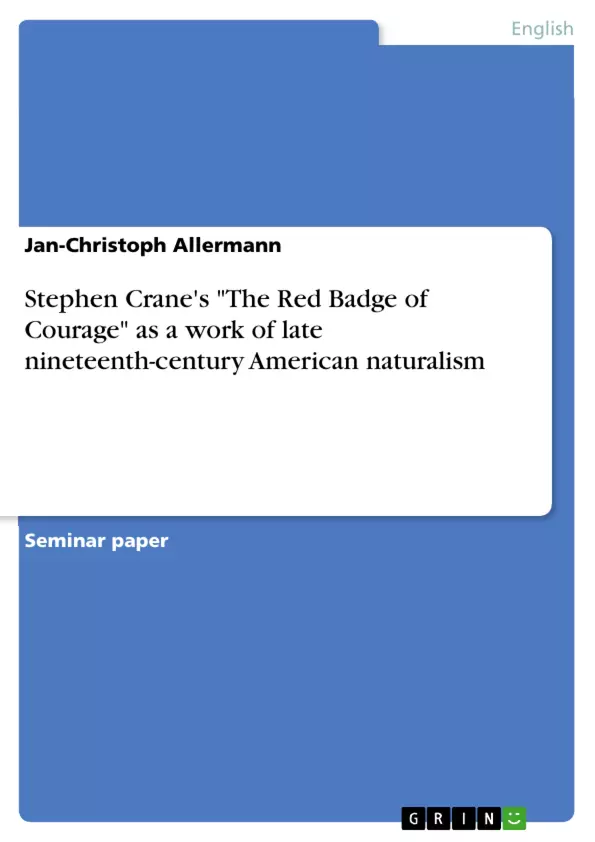When it comes to American War Writing there are several important writers which come to ones mind. One writer, however, who will most probably always be among them, is Stephen Crane. Although his “[…] contribution to the canon of American literature is fairly slight in bulk: one classic short novel, three vivid stories, and two or three ironic lyrics” , he has achieved something very remarkable. “[...]
Crane, who later saw warfare in Cuba and between the Greeks and the Turks in his work as a correspondent, had experienced no fighting when he wrote The Red Badge of Courage.” “Yet anyone who has gone through warfare, from the time of the novel’s publication (1895) until now, has testified to Crane’s uncanny accuracy at the representation of battle.” The fact that Crane’s imaginative vision is so compatible with real-life experiences of people who have witnessed battle left foremost British and later on American critics in awe and quickly established his reputation as an author. Soon after its publication The Red Badge of Courage became a bestseller.
While some people merely enjoy the book as a good read, others have digged deeper into the world of Stephen Crane in order to analyse his masterpiece. Thus it comes as no surprise that there are plenty of academic essays and reviews which deal with The Red Badge of Courage. One thing that is conspicuous throughout these essays and reviews is the ongoing discussion of whether the corresponding literary movement is actually naturalism. “Stephen Crane’s admirers regularly deny he is a naturalist out of what appears to be a fear of linking him with a circle of ´bad` writers.” For a better understanding of their fear one should know that “American literary naturalism has almost always been viewed with hostility.” But there are also those who state that “Stephen Crane will always be identified with literary naturalism.”
To throw light on the matter I will discuss, in this term paper, whether the novel contains any elements of naturalism. Beforehand I will briefly touch on the origin of naturalism and its evolvement and I will highlight the difficulties in defining the term of literary naturalism.
Table of Contents
- Introduction
- Naturalism
- The origin of naturalism
- Definition of “Late Nineteenth-Century American Naturalism”
- Elements of naturalism in The Red Badge of Courage
- Lower and middle class characters
- The fictional world of the commonplace and unheroic
- Henry Flemming controlled by instinct, environment and chance
- Conclusion
- Bibliography
Objectives and Key Themes
This term paper aims to analyze Stephen Crane's novel The Red Badge of Courage and determine whether it can be classified as a work of late nineteenth-century American naturalism. The paper will examine the historical context of the development of naturalism, defining the movement and its key elements, and then analyze how these elements are manifested in Crane's novel.
- The historical development and defining characteristics of late nineteenth-century American naturalism
- The influence of French naturalism on American literature
- The portrayal of lower and middle-class characters in The Red Badge of Courage
- The role of instinct, environment, and chance in shaping the protagonist's actions
- The novel's exploration of the realities of war and its impact on the individual
Chapter Summaries
The first chapter introduces Stephen Crane as a significant figure in American War Writing, highlighting the enduring impact of his novel The Red Badge of Courage. The chapter explores the debate surrounding the novel's classification as naturalist literature, acknowledging the ongoing discussion among critics and academics.
The second chapter delves into the origins and development of naturalism as a literary movement. It traces its roots back to mid-nineteenth-century Europe, focusing on the influence of Émile Zola and his Rougon-Macquart series. The chapter examines how naturalism emerged in America, drawing parallels with the social and economic changes occurring in both France and the United States during the late nineteenth century.
Keywords
Key terms and concepts explored in the paper include late nineteenth-century American naturalism, Stephen Crane, The Red Badge of Courage, Émile Zola, French naturalism, lower and middle-class characters, instinct, environment, chance, the realities of war, and the individual.
Frequently Asked Questions
Is "The Red Badge of Courage" considered a work of naturalism?
The paper discusses this ongoing critical debate, analyzing whether the novel's elements align with the late nineteenth-century American naturalist movement.
What are the key elements of naturalism found in the novel?
Key elements include the focus on lower and middle-class characters, a world that is unheroic, and a protagonist controlled by instinct, environment, and chance.
How did Stephen Crane write so accurately about war?
Remarkably, Crane had experienced no actual fighting when he wrote the novel in 1895; his "uncanny accuracy" came from his powerful imaginative vision.
What was the influence of Émile Zola on this literary movement?
Zola is considered the father of French naturalism, and his work significantly influenced American writers as they adapted the movement to the social changes of the U.S.
Why did some critics resist labeling Crane as a naturalist?
Historically, American literary naturalism was viewed with hostility, and some admirers feared linking Crane with a circle of perceived "bad" writers.
- Arbeit zitieren
- Jan-Christoph Allermann (Autor:in), 2006, Stephen Crane's "The Red Badge of Courage" as a work of late nineteenth-century American naturalism, München, GRIN Verlag, https://www.hausarbeiten.de/document/73483


